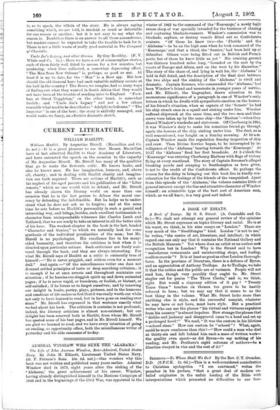ADMIRAL WINSLOW WHO SUNK THE 'ALABAMA.' The Life of John
Antrum Winslow, Bear-Admiral, United States Navy. By John M. Ellicott, Lieutenant United States Navy. (G. P. Putnam's Sons. 10s. 6d. net.)—One wonders why this book was not written and published many years earlier. Admiral Winslow died in 1873, eight years after the sinking of the Alabama,' tho great achievement of his career. Winslow, having already distinguished himself in the Mexican Campaign of 1846 and in the beginnings of the Civil War, was appointed in the
winter of 1862 to the command of the Kearsarge,' a newly built steam sloop of war specially intended for the business of chasing and capturing blockade-runners. Winslow's commission waste blockade, capture, or destroy vessels fitted out as Confederate cruisers. "Of these he knew two—the 'Florida' and the
'Alabama '—to be on the high seas when he took command of the Kearsarge,' and that a third, the Sumter,' had been laid up at Gibraltar. Others were being fitted out in British and French ports, but of these he knew little as yet." His cruising ground was thirteen hundred miles long, "bounded on the east by the coasts of Europe and Africa, and on the west by his discretion." The story of the chase of, and lying in wait for, the Alabama' is told in full detail, and the description of the final duel between the two ships and the sinking of the Alabama' is vivid and dramatic. Captain Semmes, who commanded the 'Alabama,' had been Winslow's friend and messmate in younger years of service, and Mr. Ellicott, the biographer, draws attention to the momentous significance of a paragraph in one of Winslow's early letters in which he dwells with sympathetic emotion on the horrors of his friend's situation, when as captain of the 'Somers' he had his ship struck once in a squall and sinking under him. Winslow suffered shipwreck at the same time, and the two men and their crews were taken up by the same ship—the Raritan'—when they shared Winslow's wardrobe and stateroom. Off Cherbourg in 1864, it was Winslow's duty to make his sometime friend go through again the horrors of the ship sinking under him. The duel, as is well remembered, was fought on a Sunday morning. At 10 a.m. Captain Winslow made the regulation Sunday inspection of ship and crew. Then Divine Service began, to be interrupted by in- telligence of the 'Alabama' bearing towards the • Kearsarge.' At 10.57 the 'Alabama' fired her first broadside. At 3 o'clock the Kearsarge' was entering Cherbourg Harbour with flags of victory flying at every masthead. The story of Captain Semmes's alleged breaking parole and escaping to Southampton as here given, is not to the credit of the Confederate officer. So perhaps the reason for the delay in bringing out this book lies in kindly con- sideration for the feelings of the friends of the vanquished. Apart
from this episode of the 'Alabama' the volume contains little of general interest except the fine and attractive character of Winslow himself : an admirable type of the best sort of American man, which, as we all know, is a very good sort indeed.






































 Previous page
Previous page